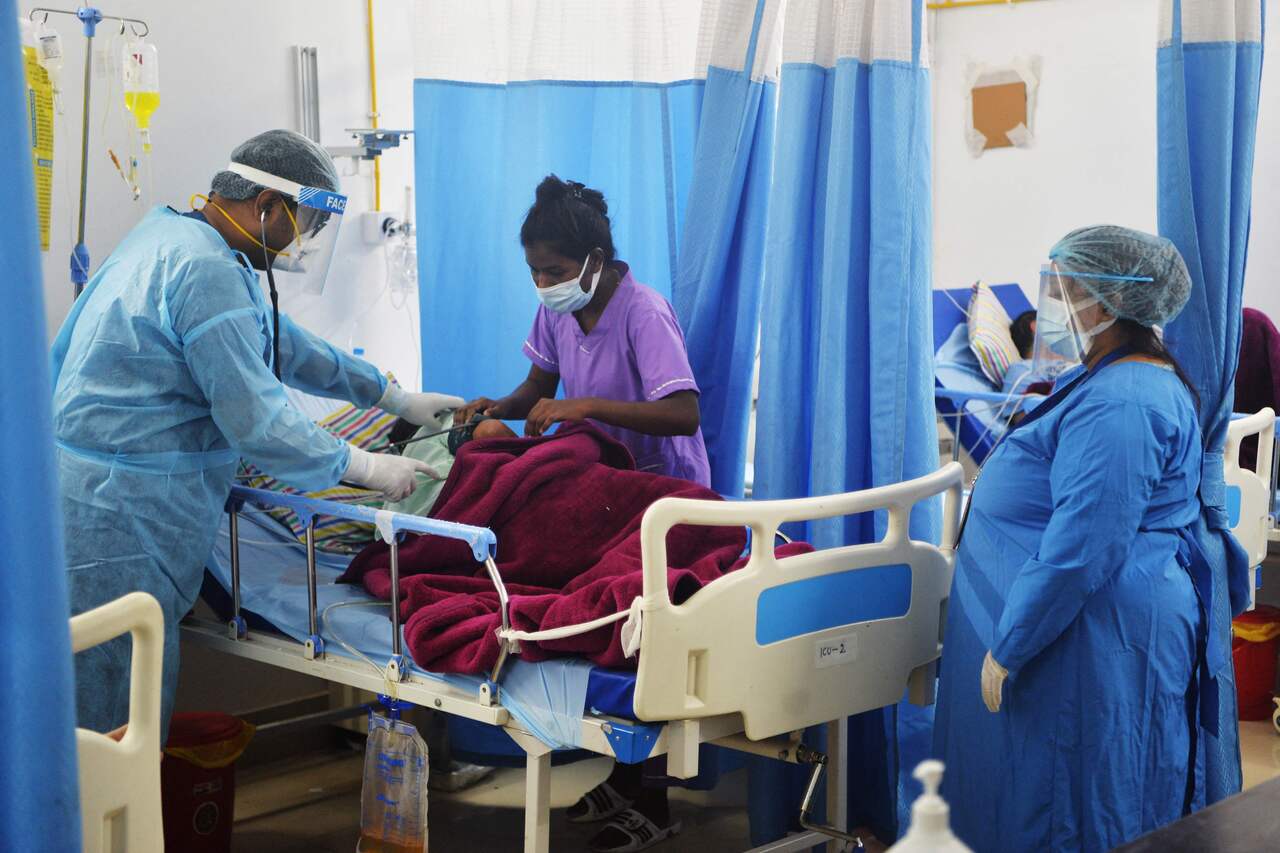Gangrene, hearing loss point to Delta coronavirus variant being more severe
Sign up now: Get insights on Asia's fast-moving developments

Dr Abdul Ghafur said he is seeing more Covid-19 patients with diarrhoea now than in the initial wave of the epidemic.
PHOTO: AFP
NEW DELHI (BLOOMBERG) - The coronavirus variant that drove India's devastating Covid-19 epidemic is the most infectious to emerge so far, and doctors now want to know if it is also more severe.
Hearing impairment, severe gastric upsets and blood clots leading to gangrene, symptoms not typically seen in Covid-19 patients, have been linked by doctors in India to the so-called Delta variant. In England and Scotland, early evidence suggests that the now-dominant strain carries a higher risk of hospitalisation.
Delta, also known as B16172, has spread to more than 60 countries over the past six months and triggered travel curbs in places ranging from Australia to the United States.
A spike in infections, fuelled by the Delta variant, has put pressure on the British government to reconsider its plans of reopening later this month.
Higher rates of transmission compared with other variants, and a reduction in the effectiveness of vaccines, have made understanding the strain's effects especially critical.
"We need more scientific research to analyse if these newer clinical presentations are linked to B1617 or not," said Dr Abdul Ghafur, an infectious disease physician at the Apollo Hospital in Chennai, southern India's largest city.
Dr Ghafur said he is seeing more Covid-19 patients with diarrhoea now than in the initial wave of the epidemic.
"Last year, we thought we had learnt about our new enemy, but it changed," Dr Ghafur said. "This virus has become so, so unpredictable."
Stomach pain, nausea, vomiting, loss of appetite, hearing loss and joint pain are among the ailments that Covid-19 patients are experiencing, according to six doctors treating patients across India. Beta and Gamma variants - first detected in South Africa and Brazil, respectively - have shown little or no evidence of producing different clinical signs, according to a study by researchers from the University of New South Wales in Sydney last month.
Some patients develop micro thrombi, or small blood clots, so severe that they led affected tissue to die and develop gangrene, said Dr Ganesh Manudhane, a Mumbai cardiologist, who has treated eight patients for thrombotic complications at the Seven Hills Hospital during the past two months. Two required amputations of fingers or a foot.
"I saw three to four cases the whole of last year, and now it's one patient a week," Dr Manudhane said.
India has reported 18.6 million Covid-19 cases thus far in 2021, compared with 10.3 million last year. The Delta variant was the primary cause behind the country's deadlier second wave and is 50 per cent more contagious than the Alpha strain that was first spotted in Britain, according to a recent study by an Indian government panel.
The surge in cases may have driven an increase in the frequency with which rare Covid-19 complications are being observed. Even still, Dr Manudhane said he is baffled by the blood clots he is seeing in patients across age groups with no past history of coagulation-related problems.
"We suspect it could be because of the new virus variant," he said.
Dr Manudhane is collecting data to study why some people develop the clots and others do not.
Doctors are also finding instances of clots forming in blood vessels that supply the intestines, causing patients to experience stomach pain - their only symptom, local media has reported.
Some Covid-19 patients are also seeking medical care for hearing loss, swelling around the neck and severe tonsillitis, said Dr Hetal Marfatia, an ear nose and throat surgeon at Mumbai's King Edward Memorial Hospital.
Every person is showing different symptoms in the second wave, she said.
The unusual presentations for Delta and a closely related variant known as Kappa, whose spread led to a fourth lockdown in Melbourne, are still being confirmed, said Dr Raina MacIntyre, a professor of global biosecurity at the University of New South Wales. "Meanwhile, it is important to take note of this and be aware of possible atypical presentations," she said.
The most alarming aspect of the current epidemic in India is the rapidity with which the virus is spreading, including to children, said Dr Chetan Mundada, a paediatrician with the Yashoda group of hospitals in Hyderabad.
Apollo's Dr Ghafur said he was also seeing entire families with Covid-19 symptoms, instead of the individuals that dominated last year, reflecting an increase in household transmission caused by the Delta variant.
Cases of mucormycosis - a rare opportunistic fungal infection - have also been surging in India. It has infected more than 8,800 Covid-19 patients and survivors as at May 22, forcing local healthcare authorities to call it an epidemic.
Even as India's outbreak begins to ease - daily infections have slipped to about a quarter of the May 7 peak - the Delta variant has sparked outbreaks elsewhere, including in Taiwan, Singapore and Vietnam, bolstering calls for mass immunisation.
But with emerging evidence that Delta and at least one other variant may be adept at evading vaccine-induced antibodies, pharmaceutical companies are under pressure to tweak existing shots or develop new ones.
"New vaccines have to be prepared with new variants in mind," said Dr Ghafur. "We can't get ahead of the virus, but at least we can keep up with it."



